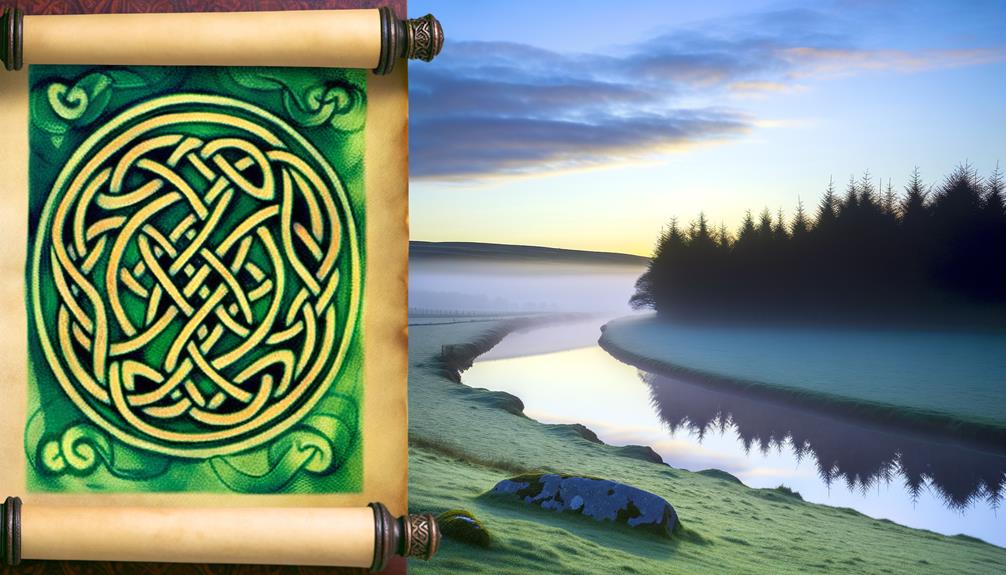Cillian Name Meaning and Origin
Cillian, derived from ancient Irish origins, is a name deeply embedded in historical, cultural, and religious contexts. It originates from Gaelic words meaning 'little church' or 'war strife', reflecting both spiritual devotion and martial valor.
The name is associated with Saint Cillian, a 7th-century missionary and martyr who played a crucial role in spreading Christianity in Franconia. Variants of the name, such as Killian and Kilian, illustrate its widespread adoption across cultures.
Cillian embodies a rich tapestry of bravery, piety, and resilience, echoing through Irish legends and contemporary culture. The following exploration provides further insights into its significant legacy. In modern times, the name Cillian has gained popularity beyond Irish borders, often chosen for its strong and noble connotations. Its widespread usage is indicative of its enduring relevance and appeal. Furthermore, the Alastair name meaning, similar to Cillian, carries a sense of strength and nobility, reflecting the deep significance of traditional names in contemporary society.

Key Takeaways
- The name Cillian means 'little church' or 'war strife' in Gaelic.
- It is of ancient Irish origin, associated with Saint Cillian, a 7th-century missionary and martyr.
- Saint Cillian is the patron saint of Würzburg, known for his role in spreading Christianity.
- Variations of the name include Killian, Kilian, Cillín, and Ceallachán.
- The name reflects values of religious devotion and martial prowess in Gaelic culture.
Historical Background
The name Cillian, of ancient Irish origin, can be traced back to early medieval times, particularly associated with Saint Cillian, a revered missionary and martyr in 7th-century Franconia.
Saint Cillian, originally from Ireland, played a significant role in spreading Christianity in the Franconian region, now part of modern-day Germany. His martyrdom in 689 AD cemented his legacy, leading to his veneration as a saint.
The name Cillian, derived from the Gaelic 'Ceallach' or 'Cillín,' meaning 'little church' or 'war strife,' reflects both his ecclesiastical mission and the turbulent era in which he lived. This historical context underscores the name's longstanding cultural and religious significance, highlighting its enduring presence in Irish and broader European heritage.
Gaelic Origins
Rooted in the ancient Gaelic language, the name Cillian derives from the words 'Ceallach' or 'Cillín,' which translate to 'little church' or 'war strife.' This etymology reflects the dual nature of Gaelic nomenclature, often combining elements of spirituality and conflict.
The linguistic structure of Gaelic names reveals a cultural emphasis on both religious devotion and martial prowess. Additionally, the name Cillian is a tribute to the historical significance of monasticism and warrior culture in Gaelic society. It encapsulates the blend of piety and valor that characterized early Gaelic communities.
Understanding this origin provides insight into the broader linguistic and cultural contexts from which the name emerged, offering a lens into the values and traditions of ancient Gaelic civilization.
Meaning of Cillian
Reflecting its rich Gaelic origins, the name Cillian encompasses meanings that signify both 'little church' and 'war strife,' embodying a dual heritage of spirituality and conflict.
The duality inherent in the name Cillian reflects the complex socio-cultural landscape of early Irish society, where ecclesiastical influence coexisted with martial traditions.
'Little church' suggests a connection to religious devotion and community, while 'war strife' points to the tumultuous periods of conflict and defense that characterized much of Ireland's history.
This juxtaposition offers a multifaceted understanding of the name, indicating that those bearing it might be seen as embodying both piety and resilience.
Such a name, hence, carries with it a profound narrative of dual existence and cultural richness.
Religious Significance
The name Cillian holds considerable religious significance, primarily due to its association with an esteemed Irish saint, Saint Cillian. As a patron saint, his influence extends to both ecclesiastical history and the broader cultural context of Ireland.
This connection underscores the enduring impact of Saint Cillian's legacy on religious traditions and the historical development of the Church.
Irish Saint Legacy
Cillian's name holds significant religious importance, derived from Saint Cillian, an esteemed Irish missionary and martyr revered for his evangelical work in the 7th century.
Saint Cillian, also known as Kilian, played a pivotal role in spreading Christianity to the Franconian region of present-day Germany. His mission was characterized by doctrinal rigor and unwavering commitment, leading to his veneration within the Christian community.
Remarkably, Saint Cillian's dedication to ecclesiastical reform and his eventual martyrdom underscore his enduring legacy. His life and work profoundly influenced religious practices and contributed to the Christianization of Europe.
This enduring heritage is encapsulated in the name Cillian, making it a symbol of religious dedication and historical significance.
Patron Saint Connection
As the patron saint of Würzburg, Saint Cillian's influence extends beyond Ireland, encompassing a broad geographical and spiritual spectrum. His missionary work in the 7th century was pivotal in spreading Christianity within the Franconian region of Germany.
Cillian's efforts in converting the pagan populations to Christianity are well-documented, establishing him as a significant religious figure in both Irish and German ecclesiastical histories. His martyrdom further solidifies his revered status, symbolizing unwavering faith and dedication.
The veneration of Saint Cillian in Würzburg highlights the transnational impact of his religious mission, underscoring the interconnectedness of European Christian traditions. This dual heritage enriches the cultural and spiritual dimensions associated with the name Cillian, resonating deeply within both regions.
Historical Church Influence
Saint Cillian's historical influence on the Church is evidenced by his substantial contributions to the Christianization of early medieval Europe. His missionary work in the 7th century was pivotal in spreading Christianity in the Franconian region of modern-day Germany.
His efforts are marked by:
- Establishment of ecclesiastical structures: Cillian played a vital role in founding churches and establishing dioceses.
- Conversion efforts: He actively converted local pagan populations to Christianity, fostering religious transformation.
- Martyrdom: His eventual martyrdom underscored his unwavering commitment to his faith, inspiring subsequent generations.
- Canonical recognition: Cillian's sainthood was formalized, reinforcing his enduring legacy within the Church.
Through these actions, Saint Cillian significantly shaped the religious landscape, embedding Christian doctrines into the cultural fabric of early medieval Europe.
Cillian in Irish Legends
In Irish legends, the name Cillian is often associated with figures of nobility and sanctity, reflecting its deep historical and cultural significance.
This name frequently appears in ancient texts and oral traditions, embodying virtues such as bravery, wisdom, and piety. Legendary narratives often depict Cillian as a heroic figure, imbued with moral integrity and spiritual strength. Such portrayals underscore the cultural reverence for qualities that were highly esteemed in early Irish society.
Moreover, the recurring presence of the name Cillian in these myths suggests its widespread recognition and esteem. This dual association with both noble and sacred characteristics provides valuable insight into the socio-cultural landscape of ancient Ireland, highlighting the enduring legacy of the name within Irish heritage.
Notable Figures Named Cillian
Notable figures named Cillian have notably impacted diverse fields such as religion, arts, and contemporary culture, showcasing the enduring relevance of the name.
An analysis of prominent individuals reveals the name's historical and modern significance:
- Saint Cillian: A 7th-century Irish missionary and martyr, pivotal in spreading Christianity in Franconia.
- Cillian Murphy: Renowned Irish actor known for his roles in films like 'Inception' and 'Peaky Blinders,' contributing significantly to contemporary cinema.
- Cillian Vallely: Esteemed uilleann piper and member of the traditional Irish band Lúnasa, enhancing the global appreciation of Irish music.
- Cillian de Gascun: A respected virologist and director of the National Virus Reference Laboratory in Ireland, influential during the COVID-19 pandemic.
These figures illustrate the name's broad cultural and professional impact.
Modern Popularity
The contemporary popularity of the name Cillian can be attributed to its rich historical legacy and its association with notable figures in various professional spheres. This name, deeply rooted in Irish heritage, has seen a resurgence in recent years, particularly in English-speaking countries.
The rise in its usage can be linked to the influence of celebrities such as Cillian Murphy, whose international acclaim in film and television has brought significant attention to the name. Additionally, the global trend of reviving traditional and unique names has played a pivotal role.
Data from national naming registries indicate a consistent upward trajectory in the name's popularity, reflecting a broader sociocultural movement towards embracing names with historical and cultural significance.
Variations and Spellings
Amidst the increasing popularity of the name Cillian, various spellings and regional adaptations have emerged, reflecting its linguistic and cultural versatility. The name, rooted in ancient Irish heritage, exemplifies adaptability across different contexts and languages.
Notable variations and spellings include:
- Killian: A more Anglicized version, frequently used in English-speaking countries.
- Kilian: Common in Germany and Eastern European nations, maintaining phonetic similarity.
- Cillín: An older Irish spelling, preserving traditional orthography.
- Ceallachán: A variant reflecting the original Gaelic form.
These adaptations signify not only the name's geographic diffusion but also its phonological flexibility, allowing it to resonate with diverse cultural groups. Such variations underscore the dynamic interplay between tradition and modernity in onomastic practices.
Cultural Impact
The name Cillian has seen significant cultural impact, particularly through its rising popularity in media and its historical significance. Prominently borne by actor Cillian Murphy, the name has garnered widespread recognition in contemporary cinema.
Additionally, its historical roots trace back to early Irish saints, further solidifying its cultural and religious importance.
Popularity in Media
Gaining significant traction in contemporary media, the name Cillian has been prominently featured in various films and television series, contributing to its cultural resonance. This increase in visibility has been partly due to notable figures and characters bearing the name, which has enhanced its appeal and familiarity.
Key contributions include:
- Cillian Murphy, an acclaimed actor known for his roles in 'Peaky Blinders' and 'Inception'.
- Fictional characters named Cillian in popular shows and movies.
- Media coverage of public figures with the name, enhancing its visibility.
- Literary works featuring protagonists named Cillian, adding to its cultural depth.
These instances collectively underscore the name's growing prominence and its integration into modern cultural frameworks.
Historical Significance
Beyond its contemporary media prominence, the name Cillian holds deep historical significance rooted in ancient Irish culture. The name originates from the Old Irish "Cillín," meaning "little church" or "monastery." It was borne by several notable figures, particularly Saint Cillian, a 7th-century missionary who played a critical role in spreading Christianity in Franconia (modern-day Germany). This historical backdrop underscores the name's enduring cultural impact and spiritual resonance.
| Historical Figure | Time Period | Contribution |
|---|---|---|
| Saint Cillian | 7th Century | Christian missionary work |
| Cillian of Nendrum | 7th Century | Monastic founder in Ireland |
| Cillian O'Rourke | 12th Century | Irish noble and warrior |
| Cillian the Scribe | 9th Century | Manuscript preservation |
Such figures exemplify the name's rich legacy and its pivotal role in Irish heritage.
Conclusion
In sum, the name Cillian, rooted in Gaelic origins, epitomizes a rich tapestry of historical, religious, and cultural significance. Like a thread woven through the fabric of Irish legends and notable figures, its meaning—often associated with 'little warrior' or 'monk'—resonates deeply.
The modern popularity and various spellings of Cillian underscore its enduring appeal. Hence, the name Cillian serves as a beacon illuminating the interconnectedness of language, history, and identity within the cultural landscape.






